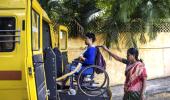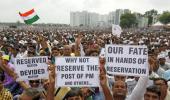Persons suffering from disabilities are "no different from you or me" and the more appropriate term to use for them would be "differently abled" and not "disabled", the Delhi high court has said.

Justice C Hari Shankar said the Right of Persons with Disabilities Act and all other laws seek to neutralise disability so that a differently abled person and his peers stand on equal footing, which is the "heart" of the theory of equal opportunity and the Constitution.
"It is because of this that the more appropriate term to use would be 'differently abled', rather than 'disabled'. Persons who are differently abled are as able as any of us; however, as their ability is different, it poses a challenge when they seek to integrate with the societal whole," said the judge in a recent order.
"Persons who suffer from disabilities, as recognized by the RPWD Act, are no different from you or me. In one way or the other, each of us suffers from disabilities, known and unknown. Yet, we all have to function as a cohesive human whole," added the judge.
The court's observations came while passing an order directing the Jawaharlal Nehru University to provide facilities to its visually impaired student who was evicted from the hostel.
In the order, the court said once the difference is "neutralized", a differently abled individual is able to rise to his full stature and invoke his innate talents and faculties to their fullest extent.
"In such a situation, the person who was otherwise regarded as 'disabled' often equals, if not excels, his more redoubtable peers in the profession that he pursues. Mr Rahul Bajaj (the petitioner's lawyer who suffers from visual impairment) is a luminescent example," observed the court.
The 49-year-old petitioner, Sanjeev Kumar Mishra, had approached the high court against his eviction from the hostel on the ground that the applicable rules do not permit hostel accommodation to a student pursuing a second postgraduate course.
The high court, while granting relief to the petitioner, said it was truly ironic that JNU was seeking to defend its case by relying on the fact that the petitioner – a 100 per cent visually challenged student – has provided a residential address 21 km away from the JNU campus.










